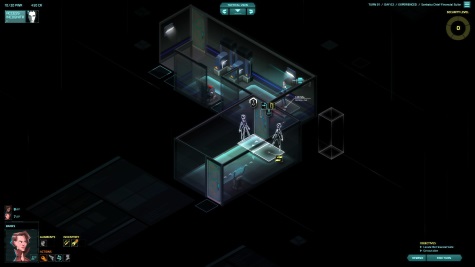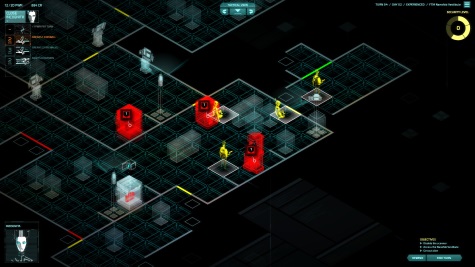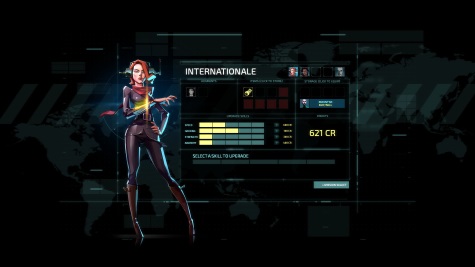I bought this based on how much I’ve liked the previous games by Klei Entertainment and the good things I’ve read about it. I don’t think I’ve ever tried a turn-based stealth game either. Unfortunately it didn’t quite sink in for me that this is really a kind of rogue-like game and my personal gaming history has taught me that I simply don’t have the perseverance for this type of gaming experience. When I make gains in a game, I prefer to keep them instead of trying and failing over and over again. Invisible, Inc. really does play like that which is why I shelved it in short order.
This one has you controlling a team of spies to infiltrate corporate facilities all around the world. All these facilities are procedurally generated and are quite small, consisting of perhaps a dozen or so rooms of various shapes linked together. The game is completely turn-based and you’re supposed to sneak through the map to achieve some objective, getting data from a specific terminal or stealing a prototype weapon, and then exiting the map. Your opponents are enemy guards, cameras and drones. Your spies are good at peeking around corners and listening for footsteps, so you have an advantage in situational awareness. But they’re bad at straight up combat. By default you can only knock enemies unconscious at melee range and they’ll only stay conscious for a few rounds before getting up again. But the guards will happily shoot you on sight.
Another mechanic is hacking. You’ll need to do this to unlock access to terminals, shut down power generators, temporarily gain control of enemy drones, sometimes even shut down the force fields of guards. This is done simply by switching to the Incognita view and spending Power points on programs to take down the enemy firewalls protecting the things you want to hack. You gain Power points through either other programs or hacking consoles and managing this resource is very much a key part of the game.
A single campaign, if that’s correct word here, is very short. The story is that your unit is compromised and is hiding aboard an aircraft. You then have 72 hours in which to prepare yourself for a counter-attack against the corporations, which consists of inserting a powerful AI into their systems. This means earning cash which you spend to upgrade your agents’ skills and gear and rescuing captured agents to fill out your roster. In that time, you can only perform about seven to nine missions before you’re forced to do the final one. In my first game, playing at the Beginner difficulty level recommended for first time players, I was able to reach the end in about five hours of playing, so that’s not much at all. As you up the difficulty level, things get exponentially tougher but the story is exactly the same.
I have to admit that due to the random nature of the levels, I got into some pretty tense moments and it felt amazingly satisfying to survive through them. One such example was when a whole bunch of guards swarmed the room just outside the exit pads and my team was just one room away. I had to resort to a careful combination of hiding, selectively knocking out guards and pure luck until enough of them randomly wandered away so I could make a run to the exit. But the random number gods can also produce hilariously easy maps when the target room and the exit room are right next to each other and near your own point of entry. The randomness also shows up in that you can choose your starting agents but not the ones you rescue, nor the items available in the kiosks you gain access to. I’ve found through my experience with rogue-likes that I tend not to like so much randomness. This is why even though I found the game mechanics to be fairly neat, my ability to enjoy this game is limited.
Still I liked a lot of things about this: I like the art design, the ideas, the characters, though I’m not sure why anyone would not take Internationale all the time, wireless hacking is incredibly powerful, even the world and the little snippets of dialogue between the agents. But I prefer a game with a more substantial campaign, a more RPG-like experience in which I can improve my agents over an extended period of time, even hand-made levels that develop the story further as you explore through them. I have to acknowledge that this game was never really for someone like me but at the same, I can also understand why so many people liked this so much.


